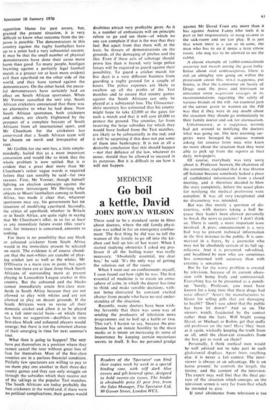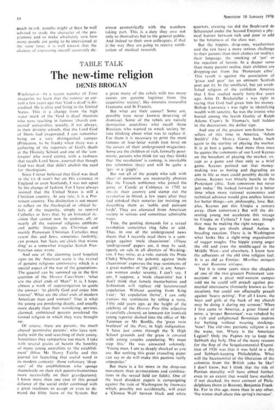MEDICINE
Go boil a kettle, David
JOHN ROWAN WILSON
There used to be a standard scene in films about doctors, where the old family physi- cian was called in for an emergency confine- ment. The first thing he did was to tell the women of the family to go off into the kit- chen and boil up lots of hot water. When I started studying obstetrics I asked my pro- fessor if all the boiling water was really necessary. 'Absolutely essential, my dear boy,' he said. 'It's the only way of getting the relatives out of the room.'
When I went out on confinements myself, I soon found out how right he was. The first essential of medicine is to create an atmo- sphere of calm, in which the doctor has time to think and make sensible decisions, with- out being distracted by constant excited chatter from people who have no real under- standing of the situation.
Recently, many doctors have been wish- ing fervently that there was some way of sending the producers of television news programmes out to boil up a kettle or two. This isn't, I hasten to say, because the pro- fession has an innate hostility to the mass media or is intent on increasing its sense of importance by keeping certain mysterious secrets to itself. It has no personal grudge
against Mr David Frost any more than it has against Auntie Fanny who teels it is part of her responsionny to nang ark•uno in the sick-room and see lair play. It is just that wnen there is a joo to oe clone, the man who has to cio it news a little elbow room. ihe dog nas to be allowed to see the rabbit.
A classic example of rabbit-concealment occurred last mouth (luring the gteat hulla- baloo about oral contraceptives. There is still an almighty row going on within the proiession aoout this. w nat nappeneu, put briefly, is that the Committee on Saiety of Drugs used the press and television to announce some itopot tarn coaliges in its
recommendations regarding the safety of various brands of the rill. An essential part
of the aavice given to women on the Pill was that it they were in any doubt about the situation they should go immediately to their family doctor and ask for clarification.
Untortunatety, as it nappeneu, n000dy had got around to notifying the doctors what was going on. 1 he next morning sur- geries were besieged by anxious women asking for counsel from men who knew no more about the situation than they were able to pick up from the reports in their daily newspapers.
Of course, everybody was very sorry about it. Professor Scowen, the chairman of the committee, explained that it was thrown off balance because somebody leaked a piece of confidential information from a closed meeting, and it therefore decided to blow the story completely, before the usual plans for notifying the medical profession were complete. It was all very exceptional and no discourtesy was intended.
But was this merely a question of dis- courtesy, with doctors taking a huff be- cause they hadn't been allowed personally
to break the news to patients? I don't think so. There is surely a more important issue involved. A press announcement is a very bad way to present technical information in the first instance to the public. It is sum- marised in a hurry, by a journalist who may not be absolutely certain of its full sig- nificance. And it is presented, sub-edited, and headlined by men who are sometimes less concerned with accuracy than with creating a sensation.
But by far the worst problem is created by television, because of its current obses- sion with being lively and controversial.
Everything has to be presented as a punch- up. 'Surely. Professor, you must have known for a long time that these drugs had toxic effects?' Aren't the manufacturers to blame for selling pills that are damaging to health?' Don't you admit that the public has been let down?' And- so on. The viewers watch, fascinated by the contest rather than the facts. Will bright young David, or Michael, or Robin, get that stuffy old professor on the run? Have 'they' been at it again, wickedly keeping the truth from us all, until the clean-cut crusaders from the box got to work on them?
Personally, I think medical men would be well advised not to take part in such gladiatorial displays. Apart from anything else, it is never a fair contest. The inter- viewer is always at an advantage. He is on home ground: he controls the length, the timing, and the content of the interview. The expert may well find that the final pic- ture of the situation which emerges on the television screen is very far from that which he intended to give.
If total abstinence from television is too much to ask, pundits might at least be well advised to study the character of the pro- gramme and to make absolutely sure how many people are going to be interviewed at the same time; it is well known that the chances of expressing oneself accurately de- crease geometrically with the numbers taking part. This is a duty they owe not only to themselves but to the general public. And indeed to their own colleagues, if that is the way they are going to receive notifi- cation of medical research.



































 Previous page
Previous page